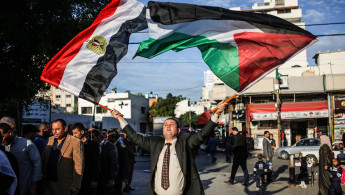Stranded Palestinians take refuge in Egypt's North Sinai as 'total blockade' covers Gaza
As the ongoing conflict between Hamas in Gaza and Israel entered its fifth day, hundreds of Palestinians have been stranded in Egypt's North Sinai province, with no means to go home until further notice.
With the Egyptian authorities shutting down the Rafah border crossing, Gaza's only connection to the outside world, since Monday evening, 9 October, the coastal enclave is in a total blockade.
Hundreds of Palestinians, including women and children, have taken refuge in North Sinai, mainly on Egypt's side of the Rafah border city and the capital, El-Arish, after Israeli air strikes cut their way towards home.
Several stranded Palestinians who witnessed the Israeli attack on the border crossing on Tuesday spoke to The New Arab and narrated their encounter with the horrific events.
"After the Israeli airstrikes broke out, many Sinai residents rushed to the help of Palestinians caught near, carrying the wounded, mostly sustaining non-fatal injuries, and providing basic needs such as food, water and blankets," a Gazan citizen told TNA on condition of anonymity for security reasons.
Another Palestinian man from Gaza remarked to TNA that he knew he might die if he attempted to return home after his family's house in Gaza had been bombarded.
"I was in North Sinai for a few days when the conflict erupted. I attempted to go back home in the early hours of Monday. But the crossing gates on both sides were hit out of the blue," he recalled.
"The women and children present were terrified, while many sustained non-fatal injuries as chaos erupted in the process," he added. "A general state of tension broke out as cars of Egyptian civilians that attempted to evacuate Gazans from the scene arrived during the same time of the arrival of aid convoys meant to enter Gaza."
Rafah is the sole possible crossing point into Sinai for Gaza's 2.3 million population. The sea surrounds the rest of the small land strip on one side and Israel on the other, which has announced a total siege of Gaza before a potential ground offensive.
Dozens of Bedouin and urban homes in El-Arish currently host stranded Palestinians whose fate remains unclear amid the ongoing closure of the border crossing.
"We know we are safe here in Sinai, but our families are not," a Gazan citizen said.
Local sources told TNA that no aid had been delivered to Gaza through, either by Egypt or any other country.
On Wednesday morning, the Israeli state broadcaster Kan reported that the United States had been looking to establish a humanitarian corridor to evacuate Palestinians and US citizens from Gaza.
An official from the US embassy in Israel told Kan: "I cannot speak on behalf of the Egyptians, but I am confident they will allow this."
A day earlier, Egyptian President Abdul Fattah al-Sisi affirmed that his country's national security was a "top responsibility" in response to the report of a possible exodus of Palestinians from Gaza to Sinai.
Sisi said that "there should be no complacency or negligence in Egypt's national security issues under any circumstances," according to the Middle East News Agency (MENA).
A fierce and unprecedented Israeli bombardment of the Gaza Strip followed the Hamas assault. Israeli aircraft have dropped hundreds of tons of explosives.
The death toll from about four days of Israeli attacks has reached 1,055 Palestinians, including 260 children and 230 women. The number of Israeli casualties from the Hamas attack has reached 1,200, with 2400 injured.





 Follow the Middle East's top stories in English at The New Arab on Google News
Follow the Middle East's top stories in English at The New Arab on Google News


